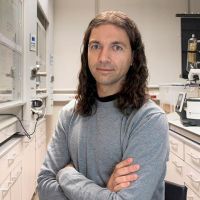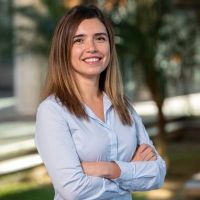13th Early Stage Researchers Workshop in Nanoscience
- Home
- Introduction
- Committees
- #ESRW Social Scientific Session
- Scientific programme
- Location & Contact
- Book of abstracts
-

14th December 2023
Invited speakers:
*Click on the names to expand and see the abstracts and biographies.Prof. Carlos Romero (Universidad de Castilla La Mancha)

Harnessing Six-Membered Phosphorus Heterocycles in the Design of π-Extended Organic Architectures: A Pathway to Enhanced Stability and Luminescence
Abstract
π-Extended organic architectures represent a captivating class of compounds with profound implications in materials science. The exceptional properties attributed to these compounds, such as strong luminescence and high charge mobilities, are primarily driven by the efficient overlap of atomic orbitals across an extended network of polyaromatic systems. However, the practical utility of large π-systems is hindered by issues like susceptibility to oxidation, decomposition, and poor processability, which impede a comprehensive understanding of their physicochemical properties.
In that context, six-membered phosphorus heterocycles (6M-PHs) are particularly attractive building blocks.1 Their introduction into the framework of π-extended systems often leads to lowering both the LUMO and HOMO and thus decreases the chance of oxidative or photodecomposition.2 However, the chemistry of fused systems based on 6M-PHs is at its early stage; benchmarking structure/properties relationships are still far from being established.
In this communication, I will present an overview of our research efforts on π-systems based on 6M-PHs. I will describe the synthesis and properties of materials featuring an increasing number of phosphorus heterocycles. Furthermore, I will also discuss the impact of the phosphorus post-functionalizations into their optoelectronic and physicochemical properties; most of the derivatives are highly soluble in common organic solvents and feature fluorescence quantum yields up to 84%. All-in-all, I will describe the benefits of introducing 6M-PHs into large π-extended systems, paving the way for enhanced stability and luminescence, and shedding light on the potential applications of these materials in diverse fields of science and technology.
Biography
Carlos Romero-Nieto obtained his PhD in organic chemistry from the University of Castilla-La Mancha (Spain). During his PhD, in 2008, he joined the group of Prof. Thomas Baumgartner, at the University of Calgary (Canada) for more than one year. In 2010, he moved to the University of Erlangen-Nuremberg (Germany), Prof. Dirk Guldi's group, to pursue a postdoc in physical chemistry. In 2013, he was awarded with the Liebig Fellowship, which allowed him to start his independent career at the University of Heidelberg (Germany). In 2019, he obtained the habilitation (Venia Legendi) from the University of Heidelberg. Back to Spain, at the Faculty of Pharmacy of the University of Castilla-La Mancha, Carlos Romero-Nieto leads a research group focused on the development of new synthetic methodologies for the preparation of novel systems based on six-membered phosphorus heterocycles for bio-applications and materials science, and the investigation of their properties. He has published more than 55 articles in high-level scientific journals, 18 of which have appeared on the cover. Since he started with his research group at the University of Heidelberg in 2013, he has supervised more than 50 researchers and has led 12 research projects with regional as well as national and international funding. He has presented the science of his research group at more than 50 scientific conferences and given more than 25 seminars at some of the most prestigious universities in 4 continents.
In 2016, Carlos Romero-Nieto was awarded by the University of Heidelberg with the prestigious Hengstberger Award for Young Researchers. In 2018, he obtained the National Award for Young Researchers from the Spanish Royal Chemical Society (RSEQ), in 2020 the Award for Young Researchers from the Spanish Royal Chemical Society of Castilla-La Mancha and, in 2021, he was awarded as Fellow by the International Association of Advanced Materials. In 2023 he was awarded the Prize for Young Researchers from the Regional Government of Castilla-La Mancha and obtained the ERC Consolidator.
Dr. Katherine Villa (Institut Catalá d'Investigació Química ICIQ)

From Design to Motion: Unveiling the Potential of Light-Driven Microswimmers
Abstract
Self-propelled micro/nanoswimmers represent a groundbreaking technological frontier, wherein tiny devices adeptly convert energy from their surroundings into mechanical motion. In particular, optical actuation emerges as a particularly promising avenue, offering a multi-faceted toolkit encompassing wavelength, polarization, intensity, and direction for motion modulation.
Within this presentation, I will introduce a novel class of photoactive microswimmers constructed from semiconductors, capable of responsive movement under external light irradiation. The talk will focus on the fundamental principles underpinning self-propelled photocatalytic-based microswimmers, followed by an exploration of diverse strategies aimed at cost reduction and enhanced synthesis yields. I will also showcase the remarkable versatility and potential of these photoactivated micromachines in the context of environmental remediation and food safety. Through illustrative demonstrations, I will demonstrate their versatility in effectively eliminating microbial and toxic contaminants from diverse samples under visible-light irradiation, thereby highlighting their tangible impact on real-world challenges.
Biography:
Katherine Villa obtained her Ph.D. in Chemistry at the Autonomous University of Barcelona. After two research positions at the Catalonia Energy Research Institute and Institute for Bioengineering of Catalonia, she joined the Center for Advanced Functional Nanorobots at the University of Chemistry and Technology, Prague (Czech Republic), where she worked as a senior scientist for 3 years. Recently, she moved back to Spain, where she is currently group leader at the Institute of Chemical Research of Catalonia (ICIQ). Her scientific trajectory has been recognized by several awards and distinctions (Young Researcher Award-RSEQ, Young Academy of Spain, Leonardo BBVA, Mother of Science-BIST, among others). Moreover, she has obtained national and international competitive funding, including a prestigious ERC Starting Grant 2022 for her project (PhotoSwim). Her research interests include photocatalysis, nanomaterials, renewable energy, micro/nanorobots, and environmental remediation.
Registration deadline: 10th November 2023. Extended to the 20th of November 2023.
Enlace a transmisión telemática (Zoom): https://nanoscience-imdea.zoom.us/j/93155352538
-
The 13th edition of the Early Stage Researchers Workshop in Nanoscience will be held on 14th December 2023 at the conference hall of IMDEA Nanociencia. The event is open to early stage researchers (PhD students and postdocs) who are invited to present their work as oral or poster communications.
The poster session of this 13th Early Stage Researchers Workshop in Nanoscience will be celebrated in parallel to the oral communications. All poster communications will be displayed in the hall of IMDEA Nanociencia on the 14th of December, from 9.00 to 17.00 h.
An award will be given to the Best Oral Communication, Best Poster Communication, and Best Twitter Poster Communication, awarded during the closing remarks thanks to the sponsor of the workshop.
Everyone is welcome to the event and whilst there is no cost, registration is required. Please, follow the steps on the "Registration" tab.
Throughout this meeting we will see the different research lines of Nanoscience currently being developed by a growing number of groups and discuss their latest results. Due to the variety of disciplines that Nanoscience embraces, we would like to remind that the audience will be diverse including physicists, chemists or biologists and therefore we ask the presenters to adjust their contributions to this audience.
-
Scientific Committee
Dr. Carmen GarcíaDr. Natalia MartínDr. Zhen ZhanDr. Vasileos BalosDr. Pierre PantaleónDr. Felipe VielaDr. Alberto MartínDr. Luis A. Campos
Dr. Raquel Utrera MeleroOrganizing Committee
Dr. Manuela GarnicaDr. Emilio M. PérezDr. Valle PalomoDr. José Ángel SilvaDr. Sara HernándezDr. M. Jesús VillaDr. Elena Alonso
Dña. Patricia López -
The #ESRWnano Social Media Scientific Session is an online event held over the internet with the purpose of encouraging the participants of 14th Early Stage Researchers Workshop in the communication of their results using social media platforms, expanding their network and fostering creativity.
The event will be held on the 17th December 2024 from 9:00 to 15:00 h.
How to participate
- Share a post of your research. The format is free. Examples: animated posters, reels, photography with your poster, etc.
- Use the hashtag #ESRWnano and the handle of IMDEA Nanociencia in each social network: @IMDEA_Nano (X), @imdeananociencia (Instagram, TikTok).
- Discuss and answer the questions from the community. We encourage you to engage in scientific debate by commenting on other posts and sharing research ideas.
Please, tag @IMDEA_Nano and the hashtag #ESRW in your tweet along with an image of your poster, photography, video or animated art of your research. The Best Social Network Communication winner will be decided by the scientific committee, according to the a) scientific content, b) presentation and c) interactivity (replies, likes and impressions).
-
The workshop will be held at the Conference Room of IMDEA Nanociencia.
Postal address: C/ Faraday, 9
Campus de Cantoblanco
28049 Madrid
SpainContact us by email at: Esta dirección de correo electrónico está siendo protegida contra los robots de spam. Necesita tener JavaScript habilitado para poder verlo.
How to arrive to IMDEA Nanociencia:
From Madrid (city centre)
- By train (Cercanías)
- Line C4 (Alcobendas-San Sebastián de Los Reyes/Colmenar Viejo), stop at “Cantoblanco Universidad” + 15 min. walk.
- By bus
- Only from “Plaza de Castilla” bus station. Line 714, stop at “Newton-Fco. Tomás y Valiente” + 3 min. walk.
“Plaza de Castilla” is connected to metro lines 1, 9 and 10.From the airport Adolfo-Suárez/Barajas
- By train (Cercanías)
- Line C1 till “Chamartin” station and change to line C4 (Alcobendas-San Sebastián de Los Reyes/Colmenar Viejo), stop at “Cantoblanco Universidad” + 15 min. walk.
- By bus
- Only from Terminal 4. Line 827, stop at “Newton-Fco. Tomás y Valiente” + 3 min. walk. There is a free shuttle bus that connects all terminals of the airport.
By taxi
- Taxi call centre: +34 91 547 8200, +34 91 371 2131.
- From the airport a flat fare of 30€ applies.




